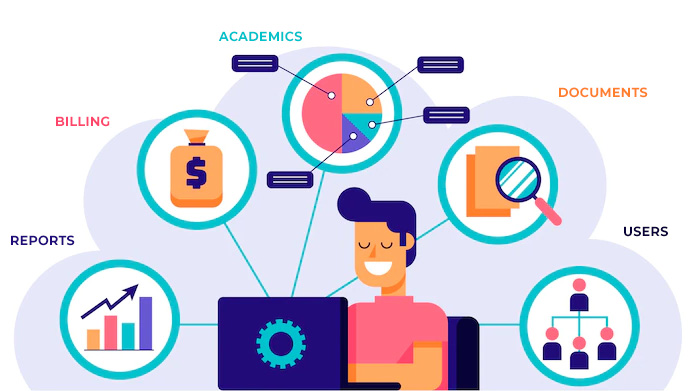Transforming School Management Across 400+ Institutions

Overview
eSCOP (Enhanced Campus Management System) by Sonet Microsystems is a robust, all-in-one Campus ERP solution tailored to streamline and automate the diverse operational and academic activities of higher education institutions. Successfully implemented in over 100+ leading campuses including JNU, Mewar, NIET, Truba, Dewan, VGI, JMC Delhi University, AMU, NIMS, Jayoti Vidyapeeth, CT and DBU, eSCOP has transformed campus management by improving efficiency, integration and educational outcomes.
Client Background
The client portfolio includes prestigious institutions such as Jaipur National University (JNU), Mewar University, Noida Institute of Engineering and Technology (NIET), Truba Institute of Engineering and Information Technology, Dewan V.S. Group of Institutions, Vidya Global Institute (VGI), Jesus and Mary College (JMC) under Delhi University, Aligarh Muslim University (AMU), NIMS University, Jayoti Vidyapeeth Women’s University, CT Group of Institutions and Desh Bhagat University (DBU).
These institutions, known for their academic excellence and innovation, faced challenges in managing expensive operations, maintaining data accuracy and ensuring a seamless educational experience for students and faculty.
Challenges
Before the adoption of eSCOP, these campuses struggled with various operational and academic challenges:
1. Complex and Disjointed Systems
- Operational Silos: Disconnected administrative and academic processes led to inefficiencies and communication gaps across departments.
- Data Duplication and Inaccuracy: Inconsistent data management practices resulted in redundancy, errors and unreliable information.
- Manual Operations: Reliance on manual processes made it difficult to manage large-scale operations, leading to delays and resource wastage.
2. Inconsistent Communication and Collaboration
- Faculty and Student Engagement: Limited and delayed communication hindered effective student support and faculty collaboration.
- Stakeholder Coordination: Difficulty in coordinating across various campus departments and external stakeholders, leading to mismanagement and poor decision-making.
3. Resource Management Challenges
- Inefficient Allocation: Challenges in efficiently managing resources such as classrooms, labs, libraries and faculty workloads.
- Financial Management Issues: Complications in tracking finances, budgeting and resource allocation due to fragmented financial systems.
4. Compliance and Reporting
- Regulatory Compliance: Difficulty in adhering to regulatory requirements due to lack of centralized data and reporting tools.
- Accreditation and Audit Readiness: Inefficient preparation for accreditation processes and audits due to scattered data and inconsistent record-keeping.
5. Scalability and Flexibility Constraints
- Growing Enrollment: Struggles to accommodate increasing student numbers and expanding campus operations without compromising quality.
- Technology Adoption: Resistance to adopting new technologies due to lack of training and system complexity.
Solution
To tackle these challenges, Sonet Microsystems implemented the eSCOP Campus ERP solution, a unified and scalable platform tailored to the unique needs of each campus.
Key Features and Modules of eSCOP:
1. Integrated Campus Management
- Admissions and Enrollment: Streamlined online admission processes with seamless integration across departments for student enrollment and record management.
- Academic Management: Comprehensive modules for curriculum planning, scheduling, attendance, grading and examination management.
- Fee and Finance Management: Automated fee collection, budgeting and financial reporting with real-time tracking of financial data.
- Library Management: Efficient cataloging, issue/return tracking and resource management for campus libraries.
- Hostel and Transport Management: Effective management of hostel accommodations, transportation logistics and route planning.
2. Enhanced Communication and Collaboration
- Faculty and Student Portals: Interactive platforms for real-time communication, access to academic resources and performance tracking.
- Notification Systems: Automated SMS, email and app notifications for important updates, events and alerts.
- Collaboration Tools: Tools to facilitate collaborative work among faculty, students and administrative staff.
3. Centralized Data Management and Reporting
- Unified Database: Centralized data storage ensuring consistent and accurate information across all departments.
- Advanced Security Protocols: Robust security measures including encryption, role-based access controls and regular data backups.
- Comprehensive Reporting: Real-time analytics and customizable reports for informed decision-making and compliance with regulatory standards.
4. Resource Optimization
- Timetable and Resource Scheduling: Automated scheduling of classes, exams and resource allocation to optimize campus resources.
- Inventory and Asset Management: Efficient tracking and management of campus assets and inventory, reducing losses and improving utilization.
- Human Resource Management: Comprehensive HR modules for payroll, attendance, leave management and performance appraisals.
5. User-Friendly Interface and Scalability
- Customizable Modules: Flexible design allowing institutions to tailor the ERP system to their specific needs and workflows.
- Mobile Access: Mobile-friendly interfaces providing access to critical information and services on the go.
- Scalability: Easily scalable architecture accommodating growth in student numbers, programs and campus facilities.
- Training and Support: Extensive training programs and ongoing support to ensure smooth adoption and operation.
Implementation Process
The deployment of eSCOP followed a strategic and collaborative approach:
1. Initial Consultation and Assessment
- Conducted a thorough assessment of each institution’s existing systems and identified key pain points and operational needs.
- Developed a tailored implementation plan, including timelines, resources and success criteria.
2. Customization and Integration
- Customized eSCOP modules to align with each campus’s unique operational and academic requirements.
- Seamlessly integrated existing data into the new system, ensuring minimal disruption and maximum continuity.
3. Training and Onboarding
- Provided comprehensive training sessions for administrators, faculty and staff to ensure a smooth transition to the new system.
- Offer user manuals, video tutorials and 24/7 support to facilitate easy adoption and ongoing use.
4. Pilot Testing and Feedback
- Conducted pilot runs to test system functionality and gather feedback from key users.
- Refined and optimized the system based on user feedback and real-world performance.
5. Full-Scale Deployment and Monitoring
- Launched the fully functional eSCOP across all departments and user groups.
- Implemented continuous monitoring and support to address any issues and ensure sustained success.
Results and Benefits
The implementation of eSCOP brought significant improvements to campus operations across all participating institutions:
1. Enhanced Operational Efficiency
- Automated Processes: Automation of key administrative tasks reduced manual effort by up to 60%, freeing up resources for academic improvement.
- Streamlined Workflows: Integrated systems eliminated redundancies and improved cross-departmental coordination.
- Real-Time Access: Centralized data management allowed for instant access to critical information and streamlined decision-making.
2. Improved Communication and Collaboration
- Student and Faculty Engagement: Real-time communication channels increased engagement and participation among students and faculty.
- Transparent Operations: Enhanced communication and transparent processes fostered trust and collaboration across the campus community.
3. Accurate Data and Compliance
- Data Integrity: Centralized and automated data entry significantly reduced errors and improved data accuracy.
- Regulatory Compliance: Comprehensive reporting and secure data management ensured adherence to regulatory standards and streamlined audit processes.
- Informed Decisions: Real-time analytics enabled data-driven decisions that improved operational efficiency and academic outcomes.
4. Optimized Resource Management
- Efficient Allocation: Optimized resource scheduling and management led to better utilization of campus facilities and assets.
- Cost Savings: Reduced operational costs through automation, better resource management and minimized paper usage.
- Financial Stability: Improved financial tracking and reporting supported better budgeting and financial planning.
5. Scalability and Growth Support
- Adaptability: The flexible system architecture allowed institutions to scale operations and incorporate new functionalities with ease.
- Growth Enablement: Supported institutional growth by accommodating increasing student enrollments and expanding campus operations without compromising quality.
- Enhanced Reputation: Improved operational efficiency and academic excellence contributed to an enhanced reputation and competitiveness.
Conclusion
The successful deployment of eSCOP across over 100+ campuses has revolutionized campus management, introducing greater efficiency, integration and transparency into everyday operations. By addressing critical challenges and providing scalable, user-friendly solutions, eSCOP has empowered educational institutions to deliver higher-quality education and achieve their academic goals.
Sonet Microsystems is dedicated to continuous innovation and excellence, ensuring that eSCOP evolves alongside the changing needs of higher education institutions. The success stories from JNU, Mewar, NIET, Truba, Dewan, VGI, JMC Delhi



